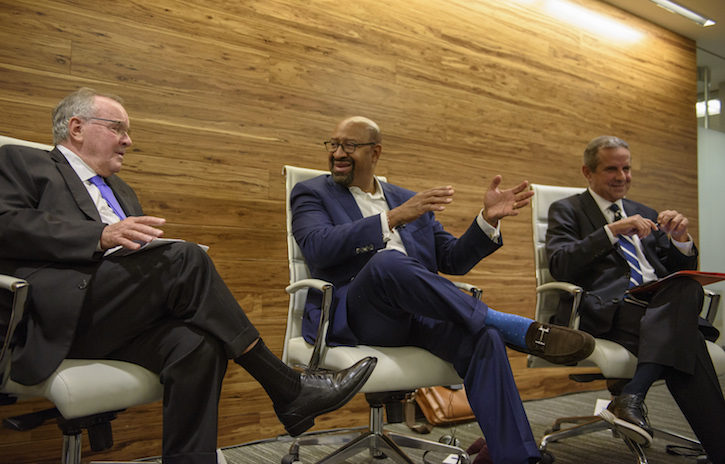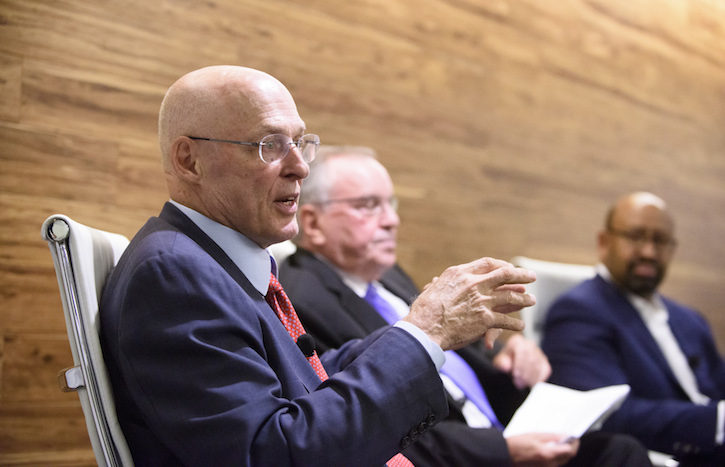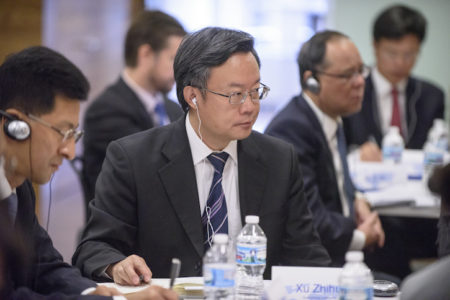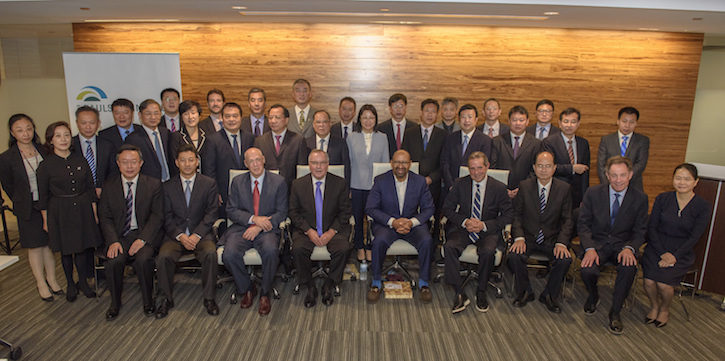
“I didn’t show them pictures of melting glaciers. I told them I wanted to talk to them about their wallet,” explained former Miami mayor Manny Diaz to a rapt audience.
The necessity of making the economic case for investing in urban sustainability was the key message a panel of former US mayors conveyed to a delegation of 25 Chinese mayors and urban planning officials from Guangdong province. The delegation was in Chicago as part of Paulson Institute’s Mayors Training Program, which equips local policymakers with the knowledge necessary to implement sustainable practices in urban centers across China. Former mayors Richard Daley (Chicago), Manny Diaz (Miami), and Michael Nutter (Philadelphia) joined a panel moderated by Institute Chairman Hank Paulson to share experiences in rolling out sustainability and economic development initiatives in each of their cities.

In addition to emphasizing the linkages between economic and environmental sustainability, the US mayors encouraged the Chinese delegation to:
Involve the business community: Mayor Daley noted the importance of having a partnership between local business and local government to create sustainable solutions that address specific local problems. Mayor Nutter echoed that sentiment when describing the emergence of a strong recycling industry with new jobs that initially developed from cooperative efforts to solve Philadelphia’s urban waste problems. Mayor Diaz explained how focusing on cost savings and new sources of revenue in conversations with business leaders helped break down resistance to stricter codes for energy efficiency in buildings.
 Have a plan, but be flexible: Mayor Diaz described his work with national experts to design a master plan for Miami that showed developers and residents a positive vision for the future. Rather than just adopting zoning plans and building codes that listed what could not be done, Miami successfully implemented an urban plan that told property developers, industry leaders, and the broader public what could be done to create a more environmentally and economically sustainable city. This plan included a requirement that all new construction over 50,000 sq feet attain LEED Silver designation or above. Mayor Nutter seconded the importance of planning, explaining that having a plan was even more important in an economic downturn because the plan continued to cast a vision for what was possible, even if the pace and scale had to be dialed back.
Have a plan, but be flexible: Mayor Diaz described his work with national experts to design a master plan for Miami that showed developers and residents a positive vision for the future. Rather than just adopting zoning plans and building codes that listed what could not be done, Miami successfully implemented an urban plan that told property developers, industry leaders, and the broader public what could be done to create a more environmentally and economically sustainable city. This plan included a requirement that all new construction over 50,000 sq feet attain LEED Silver designation or above. Mayor Nutter seconded the importance of planning, explaining that having a plan was even more important in an economic downturn because the plan continued to cast a vision for what was possible, even if the pace and scale had to be dialed back.
Engage the public: Mayor Nutter shared his view that long-term urban sustainability efforts are more successful when they are people-centered, rather than decreed from the top down. He noted that local residents were increasingly demanding that cities become more sustainable, and a responsive government genuinely needed to take those views into account. Mayor Nutter acknowledged that local governments could do a better job of helping the public connect to the city’s sustainability vision. Frequent communication about urban planning goals, and the positive benefits that achieving those goals would have on specific neighborhoods, was essential to helping the public understand the benefits and accept change. Mayor Diaz shared his view that people often oppose changes or new initiatives more often due to concerns about fairness and equality rather than opposition to sustainability. He explained the importance of spreading projects throughout a city’s neighborhoods and making sure all parts of the city were sharing in the benefits and costs.






